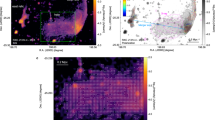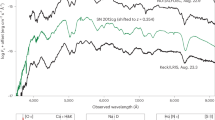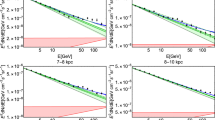Abstract
The nuclei of Seyfert galaxies contain very turbulent motion and are often intense sources of radio emission. It has been proposed that very compact supermassive objects could be the source of these energetic phenomena. Speckle observations of the nucleus of NGC1068 have revealed for the first time the presence of such an object with a diameter of ≲2.3 pc but emitting an amount of visible light equivalent to that from 5 × 109 solar masses.
This is a preview of subscription content, access via your institution
Access options
Subscribe to this journal
Receive 51 print issues and online access
$199.00 per year
only $3.90 per issue
Buy this article
- Purchase on Springer Link
- Instant access to full article PDF
Prices may be subject to local taxes which are calculated during checkout
Similar content being viewed by others
References
Humason, M. L., Mayall, N. U. & Sandage, A. R. Astrophys. J. 61 97 (1956).
Seyfert, C. K. Astrophys. J. 97, 28 (1943).
Burbidge, E. M., Burbidge, G. R. & Prendergast, K. H. Astrophys. J. 130, 26 (1959).
Glaspey, J. W., Eilek, J. A., Fahlman, G. G. & Auman, J. R. Astrophys. J. 203, 335 (1976).
Pelat, D. & Alloin, D. Astr. Astrophys. 81, 172 (1980).
Bertola, F. Astr. J. 73 (1969).
Cherespashchuk, A. M. & Lyutyi, V. M. Astrophys. Lett. 13, 165 (1973).
Booler, R. V., Pedlar, A., Spencer, R. E. & Stewart, O. J. Mon. Not. R. astr. Soc. (submitted).
Wilson, A. S. 2nd ESO/ESA Workshop (ESA SP-162, Munich, 1981).
Becklin, E. E., Mathews, K., Neugebaur, G. & Wynne-Williams, C. G. Astrophys. J. Lett. 186, L69 (1973).
Broderick, J. J. & London, J. J. Astrophys. J. 202, 596 (1975).
van Breugel, W. J. M., Schilizzi, R. T., Hanmel, E. & Kapahi, V. K. Astr. Astrophys. 96, 310(1981).
Labeyrie, A. Astr. Astrophys. 6, 85 (1970).
Beddoes, D. R., Dainty, J. C., Morgan, B. L. & Scadden, R. J. J. opt. Soc. Am. 66, 1247 (1976).
Worden, S. P. Applics. Speckle Phenomena 243, 103 (1980).
Weigert, G. P. Applics. Speckle Phenomena 243, 66 (1980).
Fienup, J. R. & Feld Kamp, G. B. Applics. Speckle Phenomena 243, 95 (1980).
Angel, J. R. P., Stockman, H. S., Woolf, N. J., Beaver, E. A. & Martin, P. G. Astrophys. J. Lett. 206, L5 (1976).
Young, P. J., Westphal, J. A., Kristian, J., Wilson, C. P. & Landauer, F. P. Astrophys. J. 221, 721 (1978).
Booler, R. V., Pedlar, A. & Davies, R. D. Mon. Not. R. astr. Soc. (in the press).
Author information
Authors and Affiliations
Rights and permissions
About this article
Cite this article
Meaburn, J., Morgan, B., Vine, H. et al. Speckle observations of the nucleus of NGC1068. Nature 296, 331–333 (1982). https://doi.org/10.1038/296331a0
Received:
Accepted:
Published:
Issue Date:
DOI: https://doi.org/10.1038/296331a0
This article is cited by
-
Infrared spectropolarimetry of Seyfert galaxy NGC1068
Nature (1984)
Comments
By submitting a comment you agree to abide by our Terms and Community Guidelines. If you find something abusive or that does not comply with our terms or guidelines please flag it as inappropriate.



